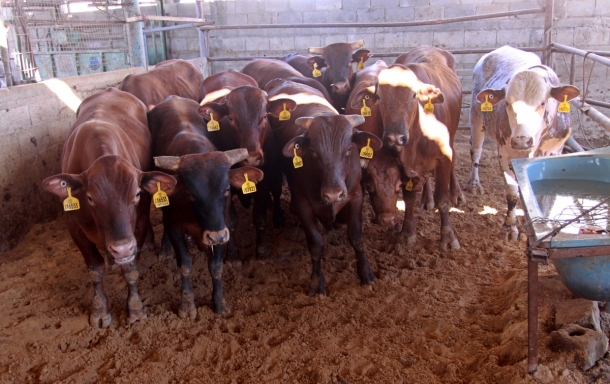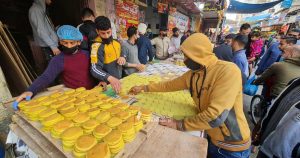Good despite the difficult economic conditions
The abundance of sacrificial calves at good prices for this year
“Good despite the difficult economic conditions.” This is how the sacrifice season was described in previous years in the Gaza Strip. It does not seem that the description will change this year, despite the availability of sacrifices at reasonable prices and good quantities, but the economic situation is still the same, suffering from weakness in the economic movement and the high rate of unemployment For more than 60%, poverty rates of 80%, and cutting salaries, which weakens the purchasing situation of citizens.
But all this does not prevent people from circumventing the economic conditions by saving the price of the sacrifice or buying it with debt in order to perform the Sunnah of the sacrifice, which is considered one of the basics of the Eid and spread joy in the hearts of the Gazan families every year, as media and economic reports confirmed that what revived the sacrifice market in previous years was the associations Charity that works on the implementation of sacrifice and feeding projects in countries such as the Gaza Strip.
Where confirmed by Eng. Hussein Al-Khatib, poultry official and media spokesperson for animal production in the Ministry of Agriculture, said that the poultry and calves market is stable in the next month until the Eid period, and we will have 20 thousand calves for slaughter, which is an abundant quantity, he said.
It is expected that the average price of a kilo will be between 18-21 shekels for a calf, depending on its type and its abundance, as the sector consumes approximately 18-21 thousand calves during the feast, and we will have 25,000 sheep for slaughter, which is equivalent to consumption.
Regarding the ministry’s preparations for this season, he says, “We do not have a crisis currently in calves and sheep, importing them has been easy for years, and their feed is not special like poultry feed, it is available and the farmer can easily mix it.”
He confirms that the ministry follows up the farms from the beginning until the slaughter by the General Department of Veterinary Medicine, as the special follow-up to the feast begins two weeks before that to monitor the specifications and inspect the slaughterhouses.
As for poultry production, Al-Khatib confirms that the quantity is sufficient, as we have approximately 80,000 turkeys, while the sector usually consumes 60-80 thousand, and in poultry, he said, “2 million locally-bred chickens will be put on the market soon, and next month before Eid there will be two and a quarter million.” Chicken and turkey, which will make the price suitable for the citizen before Eid, as we have real stability now.”
Regarding poultry feed, he said, “Feed enters from abroad. We do not have local production due to its difficulty and the need for many places and costs, but it enters without problems through the crossings. Our dependence on external feed is 98%.”
He continues, “In the seasons, we follow more closely the market situation. In general, we monitor the entry of incubator eggs to the chickens from the crossings, if he obtains technical approval because it is safe for use. We follow it in the incubators for 21 days, the hatching period, and then we follow until the chicks are delivered to the farmers.” In the presence of observers from the Ministry of Agriculture.
Follow-up continues to farmers after that also if there are problems with chicks or fodder, and confirms that the high prices that we witnessed in the past months were due to the suffering of the party from which we import from the presence of bird flu, but currently we have no problems.
As for the local production of poultry, he says, “We do not have mother farms to produce fertilized eggs, because an investment of this kind requires many costs and special conditions for production, so investors refrain from it, and prefer to buy it from abroad.”
The same applies to calves’ feed, where he said, “Importing calves and sheep’s feed is easier because it is not as special as broiler chicken feed. The farmer can buy ingredients from corn, barley and wheat rose and mix them himself, which are materials available in the external market.”
Regarding the times of crises, Al-Khatib affirms that the occupation allows the entry of these materials because it is also beneficiary even in times of wars and the closure of the crossings, so we have not yet witnessed a crisis in it, but prices are affected, especially with the rise in the prices of the basic components globally, as a ton of poultry feed amounted to 3100 shekels for the trader after it was Only 2,400 shekels, and this contributes significantly to raising the price globally and not only in the Gaza Strip.
As for the follow-up mechanism for farmers, Al-Khatib says, “We try as much as possible to support farmers affected by the war. We are working to connect them with the financiers. The General Department of Planning in the Ministry of Agriculture must approve any project that comes.” and owners, which is a regulatory matter nothing more.
He added, “The beneficiary must be an actual farmer, and there is an update every six months for the owners of poultry projects, and this is in the interest of the farmer, because poultry farming suffers from many problems, most of which are from the wrong breeding of non-specialists, so we are keen to periodically follow up on this sector, reduce chaos and support the organization of poultry breeding.”


